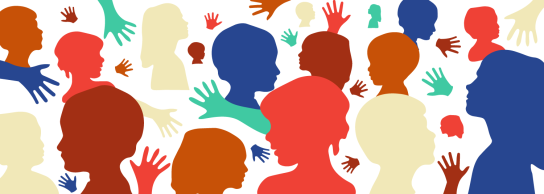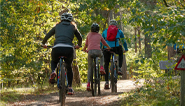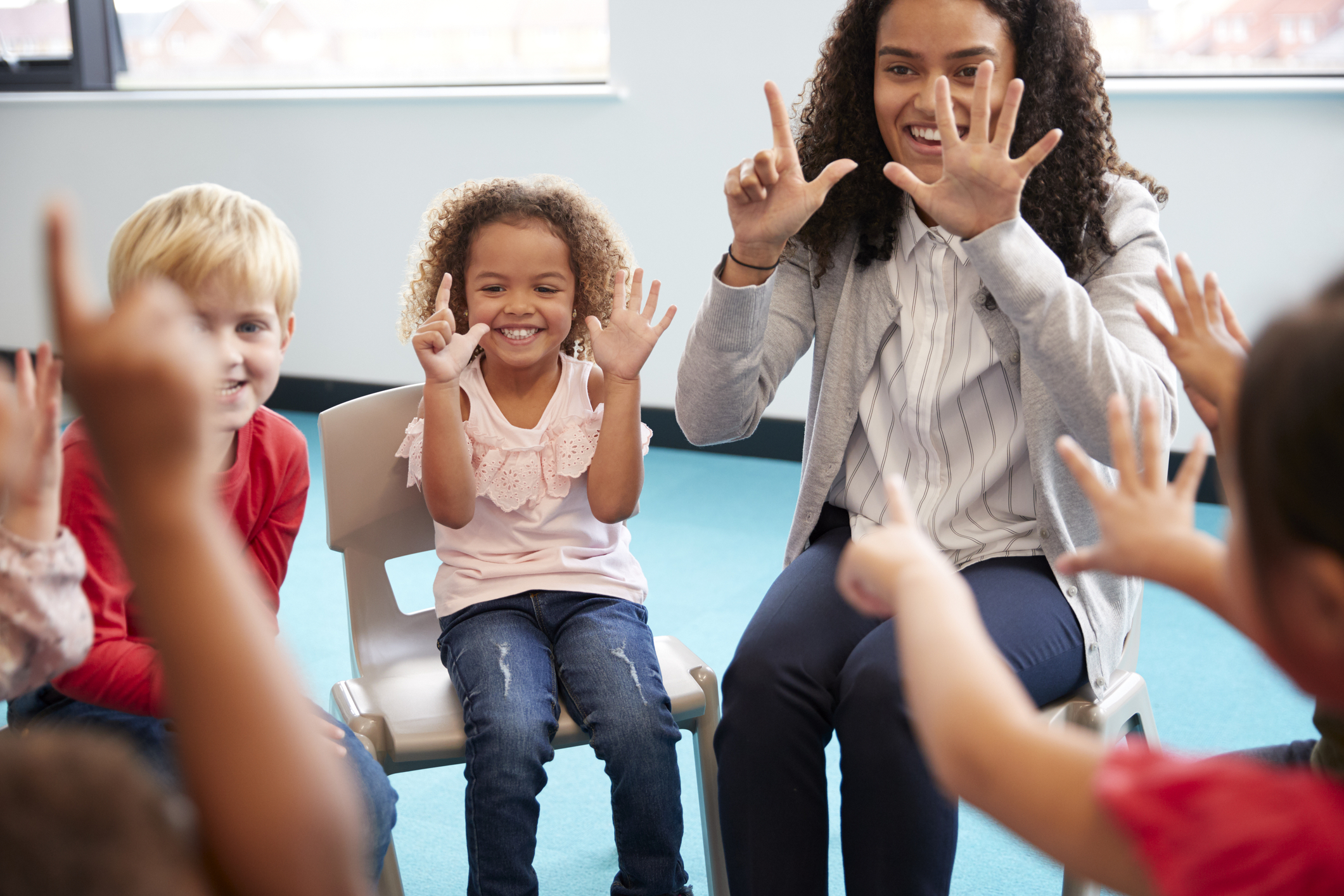Dealing with the impact of the COVID-19 pandemic
-
Are schools the best place for children to learn?
Read now to access more details of Are schools the best place for children to learn?During the COVID-19 pandemic many children have found themselves having to study at home, but is this a bad thing? Professor Jonathan Rix explores...

Article
Level: 1 Introductory
-
Remedying the impact of school closures: be kind, thank a teacher
Read now to access more details of Remedying the impact of school closures: be kind, thank a teacherHow is the global pandemic shaping teaching and learning? Dr Liz Chamberlain, a Senior Lecturer in Education Studies, explores what 'lessons' are being learned...

Article
Level: 1 Introductory
Child development
-
Supporting children's mental health and wellbeing
Learn more to access more details of Supporting children's mental health and wellbeingDo you have a professional or personal interest in the mental health issues affecting young children? Are you working with children or are you a parent or carer? This free course, Supporting children’s mental health and wellbeing, is designed to give insight into the factors that are contributing to our youngest citizens’ poor mental health; ...

Free course
24 hours
Level: 1 Introductory
-
Supporting children's development
Learn more to access more details of Supporting children's developmentSupporting children’s development is an introductory course for anyone who is interested in children’s development, especially support staff in schools, such as teaching assistants. It builds on your knowledge and skills to develop a deeper understanding of children from the early years to school leavers. You will be introduced to some core ...

Free course
15 hours
Level: 1 Introductory
-
How do children learn the concept of race?
Read now to access more details of How do children learn the concept of race?‘Children don’t see colour’ is a phrase we often hear when discussing race – but is this true? Mel Green explores how children conceptualise the idea of race and respond to it.

Article
Level: 1 Introductory
-
Bodies in transition – children starting school
Read now to access more details of Bodies in transition – children starting schoolStarting school for the first time is a significant time in a child’s life and has a long term impact on both their later school achievement and their wellbeing. EdD student Vicky Preece explains how researching the experience of children starting school in England has highlighted ways in which this transition could go as smoothly as possible so...

Article
General primary school resources
-
Primary education: listening and observing
Learn more to access more details of Primary education: listening and observingWould you like to volunteer or find work in your local primary school? Are you thinking about becoming a teaching assistant, or becoming a teacher in the future? In this free course, Primary education: listening and observing, you will have the chance to look inside primary schools, and watch and listen to children and teaching staff. You’ll ...

-
Global perspectives on primary education
Learn more to access more details of Global perspectives on primary educationThis free course, Global perspectives on primary education, provides an introduction to comparative education studies and will compare and contrast primary schooling around the world. You will look into classrooms and hear from teachers, teacher educators and policy makers from a range of education settings and countries. You will also learn ...

Primary literacy
-
Developing Reading for Pleasure: engaging young readers
Learn more to access more details of Developing Reading for Pleasure: engaging young readersIt is widely recognised that supporting children to become capable and engaged readers plays an important role in their future success. Reading empowers; it facilitates education and employment, and it enriches one’s personal life and growth. Learning to read is therefore a key goal of primary or elementary education, and high-quality literacy ...

Free course
24 hours
Level: 2 Intermediate
-
Exploring books for children: words and pictures
Learn more to access more details of Exploring books for children: words and picturesMany people have fond memories of the stories they encountered in childhood, perhaps especially of those wonderful picture books and illustrated tales which fired our young imaginations and transported us to magical worlds. To an adult’s eye, some picture books may seem remarkably simple, even oversimplified. However, in this free course, ...

Free course
8 hours
Level: 2 Intermediate
-
Encouraging book talk in the school library
Learn more to access more details of Encouraging book talk in the school libraryAs adults we sometimes struggle to justify our feelings about particular books, but children are quite clear about what they like and don't like. It is possible to get children to discuss why they liked or did not like particular books and to encourage them to think more deeply about the books they've read. This free course, Encouraging book ...

Free course
4 hours
Level: 1 Introductory
-
Reading communities
Watch now to access more details of Reading communitiesWhat are the barriers and motivations for shared reading in families? What's the importance of building reciprocal and interactive reading communities? These videos explore

Video
Level: 2 Intermediate
-
Reading communities: why, what and how?
Read now to access more details of Reading communities: why, what and how?In this article, Professor Teresa Cremin considers the long term aim of developing readers for life and challenges us to consider effective strategies and practices to genuinely achieve this.

Article
Level: 2 Intermediate
-
Writing from the heart
Read now to access more details of Writing from the heartTeresa Cremin, Professor of Literacy in Education at The Open University explores whether we offer young writers enough opportunities for ‘writing from the heart’

Article
Level: 2 Intermediate
Primary science/maths
-
Primary science: supporting children’s learning
Learn more to access more details of Primary science: supporting children’s learningScience is a key subject area in primary education curriculum frameworks. This free course, Primary science: supporting children's learning, provides an opportunity to consider your own experiences, perceptions and attitudes to science. You will explore and develop some of your scientific knowledge and understanding while considering how you can...

-
Teaching mathematics
Learn more to access more details of Teaching mathematicsThis free course, Teaching mathematics, has been designed for non-specialist mathematics teachers of 8 to 14 year olds, teaching assistants, home schoolers and parents and draws on the established provision of mathematics education at the Open University. It can also be used as Continuing Professional Development by individuals or groups ...

-
Knickerbocker glory: Explore healthy eating
Take part now to access more details of Knickerbocker glory: Explore healthy eatingUse this simple and fun activity to teach your child about healthy eating.

Primary history
-
Enhancing pupil learning on museum visits
Learn more to access more details of Enhancing pupil learning on museum visitsMuseums give children experiences above and beyond the everyday experiences that enrich and build upon classroom teaching and learning. Taking pupils to a museum, or bringing museum artefacts into school, instantly changes the dynamics of the usual learning environment. It gives you as a teacher the opportunity to start afresh with each child, ...

-
Uncovering Britain’s Lost Black Sporting Heroes
Read now to access more details of Uncovering Britain’s Lost Black Sporting HeroesWhy haven’t the often-extraordinary stories of Black sportspeople been woven into British sporting memory? What does this tell us about the relationship between ‘race’, racism and sport history? Dr Jim Lusted explores…

-
The Extraordinary Rosa Parks
Read now to access more details of The Extraordinary Rosa ParksIn 1955, Rosa Parks boarded a bus and history was changed forever.

Digital learning/digital technology
-
Children’s experiences with digital technologies
Learn more to access more details of Children’s experiences with digital technologiesThis free course, Children’s experiences with digital technologies, is an introduction to how children use digital technologies, such as mobile applications, digital games and computers, and what they learn from these experiences. The course draws on debates about screen time to critically examine and present evidence about the effects of ...

Free course
8 hours
Level: 2 Intermediate
-
Childhood in the digital age
Learn more to access more details of Childhood in the digital ageThis free course, Childhood in the digital age, delves into the lives of children and discuss the potential benefits and limitations of technology in their lives.

Free course
12 hours
Level: 1 Introductory
-
Teachers sharing resources online
Learn more to access more details of Teachers sharing resources onlineThis free course, Teachers sharing resources online, is designed to help you learn about how learning resources can be shared using online repositories, i.e. websites that allow for the uploading of electronic materials that can then be used and adapted by others. One of the leading examples of such websites is TES Connect. While the course ...

Free course
10 hours
Level: 2 Intermediate
-
Young people making their own media
Read now to access more details of Young people making their own mediaThe internet and social media have brought new opportunities for young people to tell their own stories, creating and sharing their own material with the world.

Article
Level: 1 Introductory
Early Years
-
Attachment in the early years
Learn more to access more details of Attachment in the early yearsThis free course, Attachment in the early years, covers theory and research in the area of attachment in early childhood. In the 1950s, John Bowlby was the first person to develop a theory about the significance of early attachments between caregivers and very young children. His work has stimulated a massive and very productive field of ...

Free course
6 hours
Level: 2 Intermediate
-
Play, learning and the brain
Learn more to access more details of Play, learning and the brainThis free course, Play, learning and the brain, examines the area of brain-based learning, with a particular focus on the development of the young child's brain, and is of particular relevance to those who work with young children. We begin by looking at the structure and functions of the brain, and the impact that sensory deprivation can have ...

Free course
15 hours
Level: 2 Intermediate
Special/additional educational needs
-
Understanding autism
Learn more to access more details of Understanding autismLearn about autism, one of the most challenging long-term conditions of the century. This free course, Understanding autism, introduces the autism spectrum, how it is experienced by individuals and families, and why it has become a global concern. The course explains how understanding of the autism spectrum and approaches to diagnosis and care ...

Free course
24 hours
Level: 1 Introductory
Children's perspectives
-
Children’s perspectives on play
Learn more to access more details of Children’s perspectives on playIn this free course, Children's perspectives on play, you are asked to put yourself in the place of young children and to think about their view of play and their reasons for playing. When children have personal freedom to choose and make decisions about what and who they want to play with, as well as where they want to play, they are highly ...

Free course
5 hours
Level: 1 Introductory
-
Do we really listen to children and young people?
Read now to access more details of Do we really listen to children and young people?Dr Victoria Cooper from the Children's Research Centre discusses enabling participation by children and young people.

Article
Level: 1 Introductory
Inclusion and diversity
-
Including diversity in race, ethnicity and culture in your teaching
Read now to access more details of Including diversity in race, ethnicity and culture in your teachingAre you an educator, someone working with children or with adult students, who hopes to use the Black History Month resources to make your teaching practice more inclusive for pupils and students from a black or minority ethnic background? Here are some quick tips from Anita Naoko Pilgrim on how you might approach that work.

Article
Level: 1 Introductory
-
Seeing the bigger picture: exploring the stories of children from migrant backgrounds
Read now to access more details of Seeing the bigger picture: exploring the stories of children from migrant backgroundsPhotography is one way of listening to children’s voices and discovering their multifaceted lives. EdD student Karen Horsley describes her research on the stories and experiences of young children whose families have migrated to the UK made visible through documentary photography.

Article
PE
-
Physical activity: a family affair
Learn more to access more details of Physical activity: a family affairThis free course, Physical activity: a family affair, aims to explore the effects that the family has on the amount and nature of physical activity a child participates in. The beliefs and behaviours of the family environment are the key psycho-social factors we investigate here.

-
Emotion in motion: Supporting children’s understanding of different emotions through dance
Read now to access more details of Emotion in motion: Supporting children’s understanding of different emotions through danceDance is great for children's social and emotional learning. This article explores 'Dancemotion', a collaborative project led by The Open University.

Personal/professional development
-
Looking globally: the future of education
Learn more to access more details of Looking globally: the future of educationIn this free course you will explore three big themes that are challenging the world itself and therefore education: the environment, demographic changes and the impact of technological advances. The key question is this: is education fit for this future?

-
Talk the talk
Learn more to access more details of Talk the talkThis free course introduces the mechanics of effective, persuasive oral presentations, by giving you the opportunity to analyse examples and then create your own. Using resources such as TED Talk videos, you will see how experts deliver professional talks and famous speeches, observe what works, and identify how language connects ideas and keeps...

New to language learning
-
How to learn a language
Learn more to access more details of How to learn a languageThis course introduces the skills and strategies for language learning, setting realistic goals when learning languages and keeping motivated, practise speaking skills and vocabulary learning strategies. It will enable you to evaluate resources and create a virtual immersion environment.

Free course
24 hours
Level: 1 Introductory
-
What makes it hard for migrants to learn the language of their new home?
Read now to access more details of What makes it hard for migrants to learn the language of their new home?'Why don't migrants learn English if they want to live here?' is one of those sentiments you'll have come across a lot if you've spent much time on Twitter. Maybe it's even flittered across your own mind from time to time. But, as Dr Ingrid Piller explains, just learning a language isn't as simple as that.

Article
Level: 1 Introductory
-
Seeing the bigger picture: exploring the stories of children from migrant backgrounds
Read now to access more details of Seeing the bigger picture: exploring the stories of children from migrant backgroundsPhotography is one way of listening to children’s voices and discovering their multifaceted lives. EdD student Karen Horsley describes her research on the stories and experiences of young children whose families have migrated to the UK made visible through documentary photography.

Article

Rate and Review
Rate this article
Review this article
Log into OpenLearn to leave reviews and join in the conversation.
Article reviews